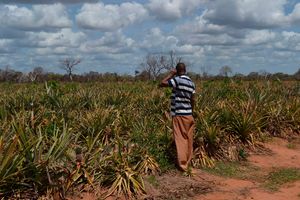
Auditor-General Nancy Gathungu.
Once a cornerstone of Kenya's efforts to ensure food security, the Agricultural Development Corporation (ADC) is teetering on the brink of collapse.
An internal audit and a report by the Auditor General for the year ending June 2023 reveal a corporation crippled by financial mismanagement, mounting debts, and a series of alarming irregularities.
The reports released in April suggest that without urgent intervention, the ADC's ability to fulfill its mandate is in serious jeopardy.
The internal audit report reveals that by the end of the financial year, ADC was burdened with over Sh1 billion in unremitted statutory arrears.
This includes Sh706 million owed to trade creditors, Sh176 million in Sacco dues, Sh13 million in unpaid National Social Security Fund (NSSF) contributions, and Sh23 million in Pay as You Earn (PAYE) obligations.
Additionally, the corporation owes Sh156 million and Sh12 million to Kenya Commercial Bank and the Agricultural Finance Corporation, respectively.
In her report, Auditor General Nancy Gathungu underscores the corporation's dire financial state, describing it as technically insolvent.
She warns that the ADC's continued operations are heavily dependent on support from the national government and its creditors. Alarmingly, the report criticises the ADC for failing to disclose its financial instability and uncertainty in its official financial statements.
The report also raises concerns about the management of publicly owned assets, including improperly documented leases of farms and buildings, as well as falsified motor vehicle ownership documents, which cast doubt on the true ownership of vehicles valued at Sh63.2 million.
It further highlights the ADC’s inability to collect revenue efficiently and its poor management of resources, further exacerbating its financial woes.
Interestingly, the corporation cannot collect revenue and cannot also adequately and prudently absorb resources at its disposal. In the report, land usage and lease appear to be the most abused sector of the ADC, with irregularities where leases are not paid, and cannot be accounted for, among other forms of mismanagement.
The consolidated statement of financial position reflects a current liabilities balance of Sh1.5 billion, which exceeds the current assets balance of Sh798 million resulting in a negative working capital of Sh797 million. Further, the company’s statement of financial performance reflects an operating loss of Sh30 million resulting in an increase in accumulated deficit from Sh1,239,254,000 in the 2022 financial year to Sh1,251,552 in 2023.
On the long outstanding trade debtors, the audit report questions some Sh239 million that cannot be verified since the entities do not exist and their records cannot be traced by corporation management for verification.
Among the said debtors include Vital Plantation whose invoice is dated 2016, Chemelil Sugar Company with an invoice dated 2009, Ministry of Agriculture with a 2010 invoice, and National Irrigation Board who are owed Sh15 million, Sh40 million, 45 million, and Sh91 million respectively.
Other debts include Sh154 million relating to unpaid wages for casual workers out of which Sh126 million was outstanding for more than one year.
There were also discrepancies in PAYE, where the corporation reported non-remittance of Sh25 million, while the Kenya Revenue Authority puts the figure at Sh34 million. On property, plant, and equipment, the report laments inaccuracies, inconsistencies, and unsupported adjustments on the financial statements.
“The property, plant, and equipment balances include adjustments in buildings, fencing and water supply, farm equipment, furniture and equipment, and motor vehicles of Sh25, 171, 000, Sh250,000, 34, 090, 00, Sh4, 479, 000 and Sh50, 246 respectively all totaling to Sh114, 236, 000. However, these adjustments were not supported by journal vouchers. The property, plant, and equipment balance of Sh1,225,948,000 includes Sh1,022,691,000 concerning leased farms, farms managed by ADC, building, fencing, and water supply. However, valuation reports and assets inventory for buildings, fencing, and water supply and leased farms were not provided for audit,” reads part of the report.
The report equally highlights the issue of expired lease agreements where tenants illegally continue to occupy public land listing Kudu Camp Galana, Drake Management, National Irrigation Board, Sabaki Tropical Fruits Limited, and Bushlands among public assets under ADC whose leases have expired but are still occupied by tenants.
The report also reveals that ADC lost 1,897 acres of land in Rumuruti, Laikipia County, due to a lease agreement failure, with no documented recovery efforts. Additionally, the corporation might have lost 685 acres of Enchili land in Mau Narok after the Lands Registrar informed ADC that the land had already been sold by the Settlement Fund Trustee in 2010.
The corporation also lacks ownership documents for 5,297 acres of land across the country, including 822 acres in Mau Narok, 1,504 acres in Lanet (Nakuru County), and 2,021 acres in Ndabibi, whose registration is still pending. On budgetary control and performance, the Auditor General says the corporation cannot generate or prudently absorb resources at its disposal.
The statement of comparison between budgeted and actual amounts reflects a final revenue budget of Sh2.42 billion, with actual revenue of Sh1.66 billion, resulting in unrealised revenue of Sh756 million, or 31 percent of the budget.
Similarly, the final expenditure budget was Sh2.23 billion, with actual spending of Sh1.71 billion, resulting in an under-absorption of Sh517 million, or 23percent of the budget. This under-collection of revenue negatively impacted the ADC's planned activities and its ability to deliver services to the public.
The report also highlights a long-standing issue with the remittance of statutory deductions. The ADC has failed to remit Sh255.9 million in deductions, including NHIF, PAYE, NSSF, and pension scheme contributions, for periods ranging from 6 to 24 years.
Notably, PAYE and NSSF remittances of Sh24 million each have been outstanding for 11 and 24 years, respectively, while NHIF remittance of Sh1.6 million is 6 years behind schedule.
Dr Joseph Rotumoi, ADC's board chairman, attributes the corporation's financial struggles to unfair competition, climate change, and numerous legal battles. In his report, he noted that while the year began well with stable weather conditions in Kitale, contributing to a slight increase in seed maize production, adverse weather and disease outbreaks in other regions, such as Tana River, Kilifi, and Laikipia Counties, led to losses in livestock and reduced herd sizes.
Despite these challenges, Dr Rotumoi stated that the board and management managed to mitigate the adverse effects by ensuring sufficient fodder and pastures and maintaining good disease control.
“The year started well in general and we experienced relatively stable and conducive weather conditions in Kitale which contributed to marginally improved production of seed maize from 7.6 to 7.8 million clean kilos.
"However, adverse weather conditions and effects of disease were experienced in other parts such as Tana-River, Kilifi, and Laikipia Counties where the corporation exercises beef animal rearing that resulted in loss of animals and reduced herd size due to low restocking. Notwithstanding these drawbacks, the board and the management were able to control the adverse effects of weather by ensuring that enough fodder and pastures are available and good control of diseases,” reads part of the chairperson's report.









